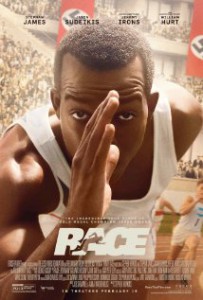While the first black Olympic track runner fights for American pride at the Summer Olympics, his fight against racism gives him the longest sprint of his life. “Race” is based on the incredible true story of Jesse Owens (Stephan James), the legendary athletic superstar whose quest to become the greatest track and field athlete in history thrusts him onto the world stage of the 1936 Olympics, where he faces off against Adolf Hitler’s vision of Aryan supremacy. To get there, he clashes with the track and field head coach for Ohio State University Larry Snyder (Jason Sudeikis). A white, hard-headed alcoholic whose marriage is on the rocks. Together, the two learn about each other and try to reach the top of their sport, despite contradicting cultures that makes their relationship a rocky one. The film’s message is an enthralling one about courage, determination, tolerance, friendship, and an inspiring drama about one man’s fight to become an Olympic legend. “Race” is rated PG-13 for minor language. It is directed by Stephen Hopkins.
“Race” catches it’s legs from a formulaic structure by offering truly heartfelt performances, while offering an inside look at foreign relations prior to World War II. It’s a hero’s story that once again shows us the real race within the race that left many of the first black athletes for their respective sports as trailblazers for a new breed. The film’s content manages many different tiers in addition to it’s main protagonist, even creating kind of an overshadowing for Owens himself. I will get to James performance later, but this film is so spread out on the plot layering that Jesse never quite feels like the most gripping aspect of his own story. The track and field races are short, predictable even for someone who doesn’t know the results, and all around anti-climatic for the real intrigue to carry us through over two hours of this film. Thankfully, Jeremy Irons comes along to stir up the pot as a real life U.S ambassador who negotiated with the Nazi’s in order to allow blacks and jews to compete in the Olympics. It’s in this story, as well as the friendship between James and Sudeikis that makes for some of the more natural moments of the films, often being donated plenty of screen time for their respective causes.
The performances break away from the typical wooden caricatures made normal for the sports biopic genre. Stephan James dazzles with a breakthrough performance that most importantly shows Jesse as no god among men. He is flawed and still growing as a man considering he is tasked with so much, and the movie’s bravery to test the audience with some less than flattering decisions he makes, left me greatly appreciated. This movie is definitely Jason Sudeikis’s coming out party. He is fantastic as this beat down former athlete. There were many times in the film when I hoped his character would stick around a little longer so we could dive more into his background. Jason offers a nice mix of his usual comedy schtick while also losing himself into several long-winded dramatic dialogues. What really blends well is the developing bond between Jesse and Larry from student/teacher to best friends. It becomes apparent midway through the film just how important each one is to the other, and it never feels anything but natural. Their on-screen chemistry radiates through one life hurdle after another, and it’s kind of nice that the movie is equal with each character discovering something hidden about the other.
The film is a little long in run time (132 minutes), and while the film offers plenty of different story arcs, it does feel a bit crowded within the final twenty minutes of the movie. By then, it’s pretty obvious where the film is going. The movie could easily pass for a Disney film with an edit because of its predictability, as well as its against-all-odds situational drama. Luckily, its never too much of a problem to steer us away from the bigger picture. The movie offers a self-reflective social commentary that hints at the naive moviegoer that even though a lot has changed, very little in fact has with race relations. A film like “Race” is most important at this place in our current history, and that perhaps secures the film’s honest approach.
Overall, “Race” is formulaic, but fulfilling. This film is inviting to every kind of moviegoer, not just sports fans. Its inspiring message, as well as heartfelt friendship between the two central characters creates an overdue tribute to one of America’s greatest heroes during the most honoring of months to African-American history. The film falls a little behind early on tired cliches, but then finds its legs to win the race by the third act when the bigger picture is unveiled.
7/10
